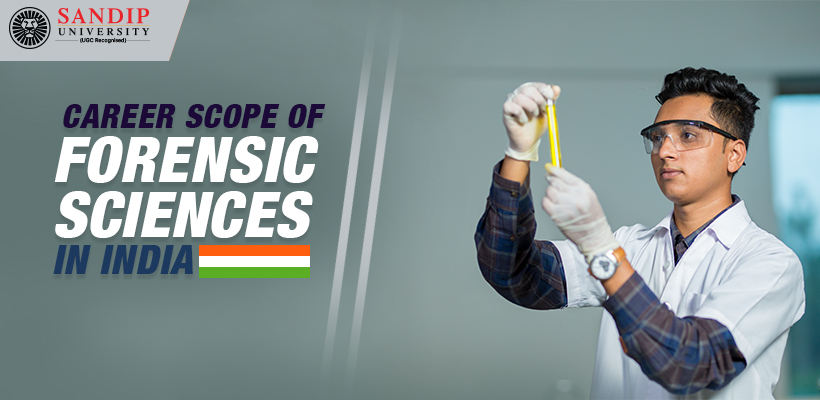Out of all the scientific specialties available, you should pick forensic science if you have an aptitude for resolving or examining crimes. Criminalistics is a term used frequently to describe the application of science to particular criminal and civil laws to deter crime. It incorporates components from the biological, chemical, physical, psychological, social, and other fields because it is an interdisciplinary study. The word “forensic” is derived from the Latin word “forensic,” which means “of or before the forum. Forensic science has a lot of uses in many fields. A good option for students to start pursuing their career in forensic science is to do a B.Sc in Forensic Science. This is one of the best forensic courses that can be pursued after 12th.
Where is Forensic Science used?
Using forensic techniques, the cause of a crime victim’s death is determined. This is accomplished by looking at the wounds, bite marks, burn markings, etc. on the victim’s body. The medical examiners also look at the changes made to the dead body after the post-mortem procedure. Forensic science also identifies the time and location of a crime, as well as the means of its commission. Specialists inspect the crime scene in order to gather fingerprints and other evidence that will help identify the criminal. Cyber crimes are also found using forensic techniques. Computer forensics is the term for this. This entails deciphering the data, tracking IP addresses or email addresses, etc. To help the police solve a case, forensic scientists collaborate closely with them. In India, there are numerous institutions that provide forensic science courses. The police are using modern criminal detection techniques to solve crimes that were unsolvable just a few decades ago. The legal system and government institutions are heavily reliant on forensic sciences to help them solve instances involving victims whose disfigured remains have nearly completely deteriorated.
There are various forensic science courses after 12th, after which the students can pursue various roles in forensic science as under:
Arson Investigator
A thorough understanding of fire chemistry and dynamics is used by an arson investigator to examine potential arson circumstances. They also speak with insurance providers, gather information from eyewitnesses and other sources, and provide expert testimony during court proceedings. The forensic science courses in Nashik train students to be arson investigators.
A Computer Forensics Examiner
Computer or digital forensics is the study of how technology is used in criminal activities. Computer gear and software are used by computer forensic specialists to retrieve data from machines that could be used in criminal trials.
The Crime Scene Investigator
In order to gather the evidence needed to reenact a violent crime, crime scene investigators spend a lot of time at crime scenes. Through meticulous documentation and evidence analysis, crime scene investigators offer evidence that is the cornerstone of most criminal trials through their work.
Criminalist
Criminalists employ empirical research and investigative techniques to determine how a certain crime occurred. Today’s criminalists are still expanding on the foundation of this profession, which stretches back to the Chinese usage of fingerprints to identify documents and clay sculptures in the year 700 AD, despite the fact that they help law enforcement with tools like 3-D imaging and DNA sequencing. The best forensic colleges in Maharashtra offer this specialisation and train the students to be criminalists.
A DNA Analyst
A DNA analyst searches for genetic information that can be used to identify both the victims and the perpetrators of violent crimes using samples of human tissue such as blood, hair, or semen. Although they may be compelled to testify in court regarding their findings, DNA analysts spend most of their time in the lab rather than at crime scenes.
Forensic Accountant
A forensic accountant searches for discrepancies in financial accounts that might be a sign of criminal conduct using fundamental accounting and investigative abilities. They carry out audits on monetary and legal records, then present their findings in court.
Forensic Anthropologist
In order to identify posthumous deaths caused by physical force or trauma, forensic anthropologists evaluate data and put scientific methods to use. Key areas of investigation are skin tissue, bone observation, and demographics.
Forensic Autopsy Technicians
For those with an interest in science, the human body, and assisting families in determining what might have contributed to a loved one’s passing, working in a coroner’s office or medical examiner’s office may be a rewarding career choice. For those who are interested in human anatomy and are not afraid of dissecting bodies, becoming a forensic autopsy technician is one alternative. Furthermore, this profession often doesn’t demand a lot of tertiary education.
Forensic Biologist
The results of a forensic biologist’s examination of the blood, bones, hair, insects, plants, and animals found at a crime scene are thoroughly studied to produce a report that can be used in court to prove the motive behind the crime. Learn more about the rewarding career opportunities provided by forensic biology by reading on.
Forensic Chemist
Forensic chemistry aims to examine physical evidence using scientific methods. Forensic chemists utilise science to solve crimes by reviewing evidence acquired from crime scenes and giving testimony based on the results of laboratory tests.
In conclusion, it can be said that there are various roles in which students can work after pursuing their degree in forensic sciences. Conventionally, this degree originated in the West, especially in the USA. However, now it is gaining popularity in India. This is mainly because fraud and crimes are increasing in India and there are not enough mechanisms to regulate them. With the help of forensic sciences, these crimes and frauds can be controlled. With this knowledge, various educational institutions are introducing this course at the bachelors, masters, and doctorate levels and are revamping their curriculum according to the latest trends and standards.

